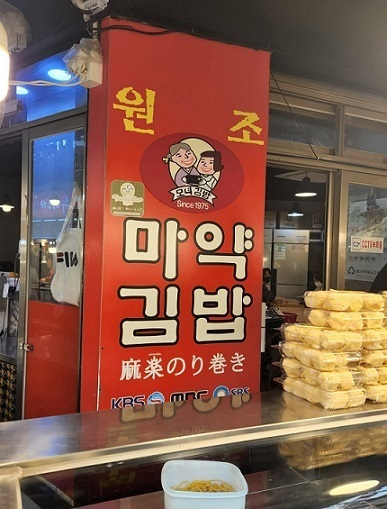Ministry backs proposed ban on use of drug references in food advertisements
By Choi Jae-heePublished : Oct. 18, 2022 - 14:10

Alarmed by a rapid rise in drug offenses, the Ministry of Food and Drug Safety said Tuesday it supports a legislative proposal to ban references to narcotics in food advertisements as something irresistibly good.
“Using drug references to promote food can have a negative effect on children or adolescents,” a ministry official said.
“Once the proposed bill gets passed by the National Assembly, the ministry will take measures, including drawing up an enforcement ordinance to curb the use of the term ‘mayak’ in food advertisements.”
Meaning drugs or narcotics in Korean, mayak has recently become a trendy adjective to describe how good food tastes. It’s most famous usage can be found in Seoul’s Gwangjang Market’s iconic mayak gimbap, the seaweed rice roll.
Earlier in August, a group of lawmakers led by Rep. Kwon Eun-hee of the ruling People Power Party submitted a bill to revise the current act on labeling and advertising of foods, which seeks to ban “expressions associated with harmful drugs or objects” in terms of food marketing. It is currently undergoing parliamentary deliberation.
“Currently, the law only prohibits the use of vulgar words or others that could stir up a speculative drive in people. Expressions like ‘mayak gimbap’ or ‘mayak tteokbokki (spicy rice cake)’ should be banned, considering the severity of drug problems,” Kwon told reporters.
The legislative bill comes amid a growing number of drug offenses in Korea, catching the once proudly drug-free nation by surprise.
Over the past four years, more than 200 cases of crimes are committed here under the effect of narcotics annually a year, according to data from the National Police Agency.
The number of such crimes totaled 221 in 2018, 236 in 2019, 182 in 2020, and 230 last year, showing a yearly average of 217.








![[KH Explains] How should Korea adjust its trade defenses against Chinese EVs?](http://res.heraldm.com/phpwas/restmb_idxmake.php?idx=644&simg=/content/image/2024/04/15/20240415050562_0.jpg&u=20240415144419)











![[Today’s K-pop] Stray Kids to return soon: report](http://res.heraldm.com/phpwas/restmb_idxmake.php?idx=642&simg=/content/image/2024/04/16/20240416050713_0.jpg&u=)